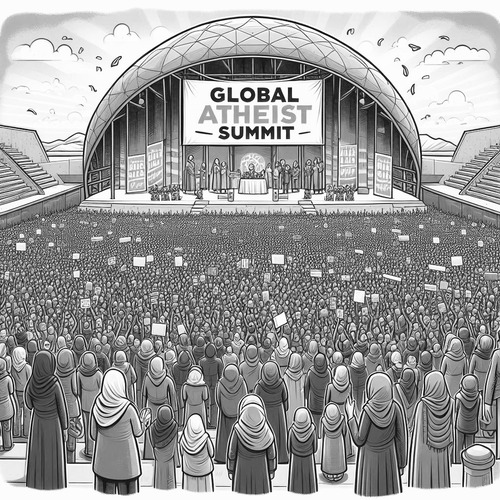The Verification Principle: Why It Fails Even Before It Starts
DEAD ON ARRIVAL
Picture this: A philosopher declares only statements we can prove through our five senses or mathematical logic have any real meaning. Everything else—including God, morality, and purpose—is literally meaningless babble.
There’s just one problem. The declaration itself can’t be proven through the five senses or mathematical logic.
Welcome to the spectacular self-destruction of the verification principle, one of the most influential yet fundamentally flawed ideas in modern philosophy.
THE GRAND AMBITION THAT BACKFIRED
In the 1920s and 30s, a group of thinkers known as the Vienna Circle had a bold vision. Led by philosophers AJ Ayer and Rudolf Carnap, they wanted to purge human discourse of all the “meaningless” metaphysical and religious claims that had plagued philosophy for centuries.
Their weapon of choice was elegant in its simplicity: the verification principle. According to this principle, a statement is meaningful only if it can be:
- Empirically verified through sense experience, or
- Analytically true like mathematics and logic
Everything else—including claims about God, ultimate purpose, and absolute morality—would be dismissed as literally meaningless. Not false, mind you, but meaningless. Like saying “The green idea sleeps furiously.”
The goal was admirable: establish a firm foundation for knowledge by eliminating speculation and focusing only on what could be rigorously proven. Science would triumph, superstition would vanish, and humanity would finally think clearly.
There was just one tiny problem.
THE FATAL CONTRADICTION
The verification principle cannot verify itself.
Think about it. The statement “only empirically verifiable or analytically true statements are meaningful” is neither:
- Something we can observe through our senses
- A mathematical or logical truth
By its own standard, the verification principle is meaningless.
This isn’t a minor technical glitch—it’s a fatal logical contradiction. The principle commits philosophical suicide the moment it’s stated. It’s like declaring “I never speak English” in perfect English, or writing “Words don’t exist” with words.
The Vienna Circle had created a principle that refuted itself before they could even finish explaining it.
THE PROBLEMS RUN DEEPER
Even if we could somehow fix this self-refutation problem, the verification principle faces a cascade of other fatal flaws.
Scientific Laws Can’t Be Verified: Consider the scientific statement “All copper conducts electricity.” No matter how many copper samples you test, you can never verify this universally. There might be some piece of copper somewhere that doesn’t conduct electricity. As David Hume showed centuries ago, we can’t logically jump from particular observations to universal claims.
If the verification principle were true, basic scientific laws would be meaningless. The very science the principle was designed to protect gets thrown out with the metaphysics.
Observation Isn’t Neutral: The verification principle assumes we can have pure, uninterpreted sense experience. But this is a myth. Every observation is theory-laden. When you look at a sunset, you’re not just receiving raw sensory data—you’re interpreting the data through conceptual frameworks about light, earth’s rotation, and atmospheric effects.
There are no “brute facts” that speak for themselves. All facts are interpreted facts, which means the verification principle’s foundation—neutral empirical observation—doesn’t exist.
Historical and Moral Claims Vanish: If only empirically verifiable statements are meaningful, then historical claims become problematic. We can’t empirically verify George Washington crossed the Delaware—we weren’t there to observe it.
Even worse, moral statements lose all meaning. “Murder is wrong” can’t be verified through the five senses, so it becomes meaningless babble. The principle eliminates not just theology, but ethics, history, and huge swaths of meaningful human discourse.
THE REFORMED RESPONSE: NO NEUTRAL GROUND
From a Reformed theological perspective, the verification principle’s failure isn’t surprising—it’s inevitable. Here’s why.
All Reasoning Starts with Faith: The great Reformed apologist Cornelius Van Til understood something the Vienna Circle missed: there are no neutral starting points in human reasoning. Everyone begins with fundamental faith commitments about the nature of reality.
The verification principle didn’t eliminate faith—it smuggled in materialistic faith assumptions. It assumed without proof that:
- Only physical reality exists
- Human senses and reason are reliable guides to truth
- The material universe is all there is
These are faith commitments, not proven facts. The principle was never neutral—it was religious from the start—just with a different god: autonomous human reason.
Only God Makes Sense of Sense: Here’s the deeper problem: without God, we can’t make sense of the very things the verification principle depends on. How do we account for:
- Logic itself? Why should logical laws exist and remain constant?
- The uniformity of nature? Why should the future resemble the past, making induction possible?
- The intelligibility of the universe? Why should human minds be able to understand physical reality at all?
These aren’t empirically verifiable facts—they’re necessary presuppositions that make empirical verification possible in the first place. And they only make sense if there’s a rational, unchanging God who created both mind and matter to correspond with each other.
Scripture Provides What Secular Philosophy Cannot: The verification principle failed because it tried to build knowledge on the shifting sand of human autonomy. But Scripture provides what no secular epistemology can: a reliable foundation for knowledge that doesn’t collapse into self-contradiction.
God’s revelation gives us:
- Absolute laws of logic grounded in God’s unchanging nature
- Reliable knowledge about both physical and spiritual reality
- Moral absolutes that transcend cultural preference
- Ultimate meaning that makes sense of human experience
This isn’t blind faith—it’s the only rational foundation that can account for rationality itself.
IMPLICATIONS FOR CHRISTIAN APOLOGETICS
The verification principle’s spectacular failure teaches us several crucial lessons:
Don’t Accept “Neutral” Ground: When skeptics demand we prove God’s existence using only “neutral” evidence, let’s recognise the trap. There is no neutral ground. Everyone starts with faith commitments. The question isn’t whether to have faith, but where to place it.
Instead of trying to meet sceptics on supposedly neutral terrain, challenge their foundational assumptions. Show them their materialistic faith cannot account for the very logic and uniformity they use to construct arguments.
Press the Fundamental Questions: Ask the hard questions:
- How does your worldview account for the laws of logic?
- Why should the future resemble the past?
- What makes your moral judgements anything more than personal preference?
- How can mindless matter produce rational minds?
These questions expose the bankruptcy of secular epistemology and point toward the necessity of divine revelation.
Proclaim with Confidence: The verification principle’s collapse doesn’t just clear away one bad argument—it demonstrates Christian truth claims aren’t just meaningful, they’re necessary. Without the God of Scripture, human knowledge becomes impossible.
This means we can proclaim the Gospel with intellectual confidence. We’re not peddling comforting myths or asking people to believe despite the evidence. We’re offering the only foundation that makes evidence, logic, and meaning possible in the first place.
CONCLUSION: THE TRIUMPH OF DIVINE REVELATION
The verification principle was supposed to eliminate God from intellectual respectability. Instead, its failure points directly to the necessity of divine revelation.
When human reason tries to operate autonomously—without acknowledging its dependence on God—it inevitably refutes itself. The verification principle is just one dramatic example of this universal pattern.
The verification principle failed even before it started because it began with the wrong foundation. It tried to build knowledge on human autonomy rather than divine revelation. In a world of shifting philosophical trends, we have something the Vienna Circle never did: a foundation that cannot be shaken. Because it’s not built on human wisdom, but on the unshakeable Word of the living God.
THE VERIFICATION PRINCIPLE: RELATED FAQs
Did the logical positivists themselves realise the verification principle was self-refuting? Yes, they did—and their attempts to fix it only made things worse. AJ Ayer tried to weaken the principle by distinguishing between “strong” and “weak” verification, while others like Carl Hempel proposed the “confirmability” criterion instead. But each modification either remained self-refuting or became so broad it admitted the very metaphysical claims they wanted to exclude. By the 1960s, most philosophers had abandoned verification entirely, with WVO Quine delivering what many consider the final blow in his famous essay Two Dogmas of Empiricism.
- How do scholars like Francis Schaeffer and John Frame view the verification principle’s collapse? Schaeffer saw the verification principle’s failure as part of a broader pattern: when we try to live without God’s revelation, we inevitably end up in self-contradiction and despair. He argued the collapse of logical positivism contributed to the postmodern retreat from objective truth. John Frame emphasises the principle’s failure demonstrates the necessity of presuppositions—we cannot escape making faith commitments about ultimate reality. Both scholars use this as an apologetic opportunity to show only the Christian worldview provides a coherent foundation for knowledge and meaning.
- What’s the difference between the verification principle and Karl Popper’s falsifiability criterion? Popper’s falsifiability criterion was actually developed as an alternative to verification. While verification demanded meaningful statements be provable, Popper argued scientific theories should be disprovable—able to be shown false by potential evidence. Popper explicitly rejected the verification principle and wasn’t trying to eliminate metaphysics entirely. However, from a Reformed perspective, falsifiability still suffers from similar problems: it cannot account for the logical laws and uniformity of nature that make falsification possible in the first place.
How does Van Til’s transcendental argument relate to the verification principle’s failure? Van Til’s transcendental argument asks: what are the necessary preconditions for intelligible experience? The verification principle assumed logic, causation, and uniformity exist without explaining why they must exist. Van Til argued only the Triune God can account for these preconditions—they reflect God’s unchanging rational nature and sovereign control over creation. The verification principle’s collapse demonstrates that when we try to use logic and science while denying their divine foundation, we end up refuting ourselves.
- Don’t some contemporary philosophers still defend verification in modified forms? Some philosophers have attempted to revive verification through sophisticated modifications, such as Michael Dummett’s “anti-realism” or various forms of “epistemic constructivism.” However, these attempts typically abandon the original goal of eliminating metaphysics and instead embrace relativistic conclusions about truth and meaning. From a Reformed standpoint, these neo-verificationist approaches still fail to provide an adequate foundation for knowledge because they remain committed to human autonomous reasoning. They may avoid outright self-refutation, but they cannot account for the objective logical laws they employ.
- How does the verification principle relate to the modern “New Atheism” movement? While New Atheists like Richard Dawkins and Sam Harris don’t explicitly embrace the verification principle, they often employ similar reasoning by demanding “scientific evidence” for God’s existence. Reformed apologists like Greg Bahnsen and James Anderson point out this approach suffers from the same foundational problems: it assumes without justification that empirical science is the only path to knowledge. The verification principle’s failure provides a historical precedent showing that such approaches inevitably become self-defeating. True apologetics must challenge these hidden assumptions rather than accept them as neutral starting points.
What practical lessons can we draw from the verification principle’s failure? The verification principle’s collapse teaches us intellectual humility and dependence on Scripture aren’t signs of weakness—they’re necessary for coherent thinking. Pastors can help congregants understand secular intellectual movements often appear sophisticated but rest on shaky foundations that eventually crumble. Christian educators can use this historical example to show students that faith and reason aren’t opposites, but that reason itself requires faith in God’s revelation to function properly. The principle’s failure also demonstrates apologetics isn’t about meeting skeptics on “neutral ground” but about showing them their own worldview cannot account for the knowledge they claim to possess.
THE VERIFICATION PRINCIPLE: OUR RELATED POSTS
Editor's Pick

Paul’s Mandate for Men: Headship Or Servant Leadership? Or Both?
Modern Christianity has fallen into a trap. We've created an either/or battle between "headship" and "servant leadership," as if these [...]

Should We Stop Using Male Pronouns for God? Why Do We Say No?
A friend of ours arrived eagerly at his first theology class in seminary. But he quickly discovered something troubling: the [...]

Did Old Testament Law Force Women to Marry their Rapists?
**Editor’s Note: This post is part of our series, ‘Satan’s Lies: Common Deceptions in the Church Today’… Viral misinformation abounds [...]

From Danvers To Nashville: Two Statements, One Biblical Vision
30 years separate the Danvers Statement on Biblical Manhood and Womanhood (1987) and the Nashville Statement on Human Sexuality (2017). [...]

The Nashville Statement: Why Affirm It Despite Media Backlash?
WHY DO REFORMED CHRISTIANS STAND BY THIS STATEMENT ON MARRIAGE AND GENDER? When the Nashville Statement was released in 2017, [...]

Who Is Belial? Solving The 2 Corinthians 6:15 Mystery
Belial: This name from the pages of Scripture chills the soul. Who is this mysterious figure Paul invokes in 2 [...]

Celibacy Or Castration: What Jesus Really Means in Matthew 19:12
One of Scripture's most shocking misinterpretations led theologian Origen to castrate himself in the third century. His tragic mistake? Taking [...]

Philippians 4:13: Did Paul Really Mean We Can Do ALL Things?
"I can do all things through Christ who strengthens me." It's on gym walls, graduation cards, and motivational posters everywhere. [...]

The Ordinary Means of Grace: Why Are They Indispensable?
ORDINARY MEANS FOR EXTRAORDINARY TRANSFORMATION What if God's most powerful work in believers' lives happens through the most ordinary activities? [...]

Is the Bible God’s Word? Or Does It Only Contain God’s Word?
The authority of Scripture stands at the crossroads of modern Christianity. While some argue the Bible merely contains God’s Word [...]
SUPPORT US:
Feel the Holy Spirit's gentle nudge to partner with us?
Donate Online:
Account Name: TRUTHS TO DIE FOR FOUNDATION
Account Number: 10243565459
Bank IFSC: IDFB0043391
Bank Name: IDFC FIRST BANK






